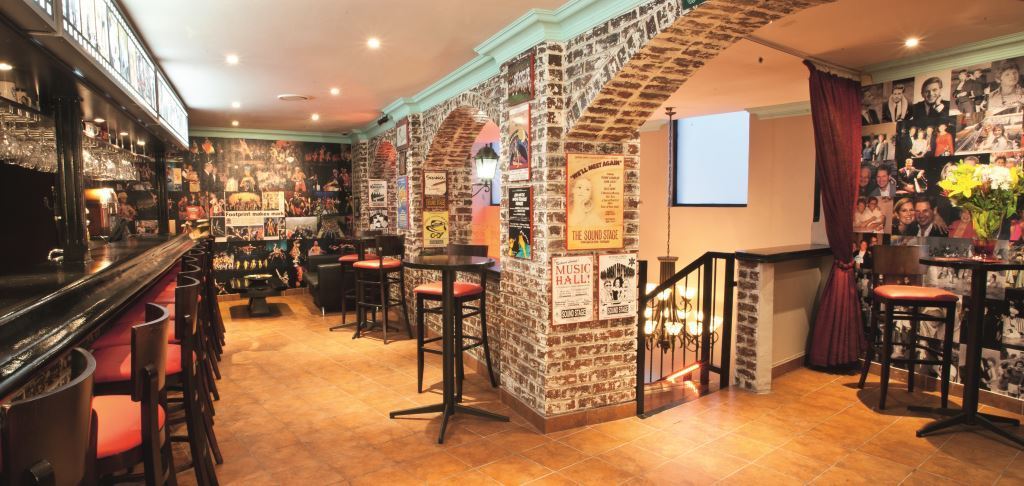Turning a theater into a profitable business is a risky venture anywhere in Africa, even in Cape Town, one of the continent’s top tourist destinations, where almost four million well-heeled foreign visitors flock every year. The few new stages that open—usually backed by hefty sums of venture capital or public funding—manage to make profit; most close their doors after a few years.
That is not discouraging Richard Loring, one of South Africa’s foremost entertainers and producers. With a 50-year career in theater, film and music under his belt, if anyone can pull off turning a theater into a lucrative enterprise, it must be him. Loring, who was born in the British tax haven of the Channel Islands, started his career in London’s famous West End theater district and moved to South Africa in the 1970s where he fell in love with the country and its people. He opened Richard’s Supper Stage & Bistro in mid-July, together with business partner Roland Seidel.

Richard Loring, co – founder of Richard’s Supper Stage & Bistro
It’s a whopping half-a-million-dollar venture in a double-storey building in Cape Town’s Sea Point suburb that the two believe will rake in profits in no time.
“It’s much more than a theater. It’s a tourism entertainment business,” explains Seidel, a German entrepreneur with expertise in the wine, tourism and shipping industries. He believes the venture will create 60 to 80 sustainable jobs.
As well as the stage, there is the restaurant downstairs, which opened its doors in January and can feed 110 diners seven days a week. From there, a staircase leads up to the supper club, which seats 184 guests who can dine to views of two landmarks: Robben Island, where South Africa’s first black president Nelson Mandela was incarcerated for 27 years and Cape Town’s World Cup soccer stadium.
The bar upstairs doubles as Loring’s hall of fame—almost like his autobiography in pictures. In a South African version of Hard Rock Café, the bar’s walls are covered in photographs and other memorabilia from five decades in musical theater, television, movies and cabaret. There is Loring arm-in-arm with British pop star Cliff Richards, with whom he once recorded an album, smiling into the camera with Grammy winning singer, Olivia Newton-John, sharing a drink with South African business magnate, Sol Kerzner, posing with trumpet legend Hugh Masekela and shaking hands with Mandela. “They are all friends and colleagues,” he says with pride.
But that’s not all. Loring also plans to use the venue to showcase young, up-and-coming South African talent by organizing additional events to the supper club shows. And lastly, the restaurant, bar and theater can be hired for different types of functions, from weddings to bar mitzvahs and product launches.
It is not the first time that Loring has tried his hand at a supper theater. For 18 long years, from 1989 to 2007, he ran the Sound Stage theater and dinner venue in Johannesburg—“South Africa’s first real supper theater”. And so the launch of Richard’s is somewhat a return to old roots, a real homecoming.
“We all look for some form of escapism in our lives. Of course, the supper club is a business, but I am an entertainer at heart,” he says, while sipping on a glass of white wine at one of his bistro tables.
Under the motto “good times, good music, good friends”, Loring and Seidel offer visitors a three-course dinner and a night of entertainment for $50, with a twist. The surprise element: the entire dining room becomes the stage. After the guests are seated at their tables, they suddenly realize they have already met most of the evening’s performers: the parking attendants, security guard, receptionist, waiters and waitresses all form part of the show. With song, dance and performance, they tell stories of Cape Town’s mixed-race community during and after the fight against the racist apartheid regime.
“Tourists want to see more than sights. They want to understand as much as possible about a place and its people,” believes Seidel, who until two years ago owned Seidelberg wine estate near Paarl, a 45-minute drive from Cape Town, where he hosted 100,000 visitors each year. While South African tourism offerings usually focus on showing foreigners the beauty of the Western Cape—from Table Mountain to the province’s pristine beaches; the Cape Winelands; Garden Route and Karoo—Richard’s will introduce visitors to the Cape’s history, people and culture.
“We hope people will take a slice of Cape Town back home with them,” says Loring.
He and Seidel have given themselves four short years to see a return on their investment.
“I realize that that’s ambitious, but we have a carefully thought-out marketing and business plan,” explains Seidel, the business brain behind the venture.
“If you’re not ambitious, you might as well not do it.”
At the core of that plan is close collaboration with the Western Cape province’s tourism department as well as with hotels, tour operators and sightseeing busses to draw large crowds. They’ve even built a bus stop right in front of the theater so that big tour busses can unload.
“Tourism is bound to grow in South Africa, even in these [economically] tough times,” Seidel is convinced.
“Once the tourism season is on again, in a couple of months, we expect to see positive cash flow.”
The latest statistics back Seidel: almost a million visitors arrived at Cape Town’s international airport in the fourth quarter of 2011 alone, according the latest Western Cape Tourism Barometer. That represents a year-on-year growth of 5.2% and is almost half of the 2.24 million tourists the entire country booked in the same time period. If Loring and Seidel manage to draw just one in 10 they are in business.
